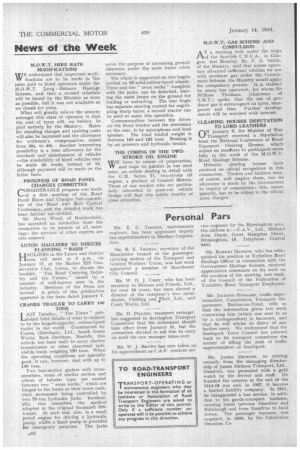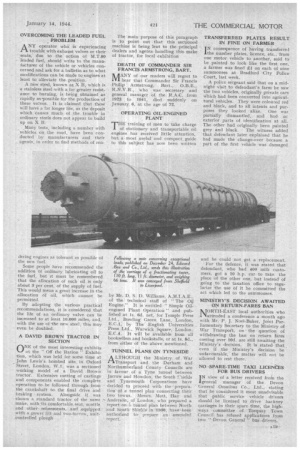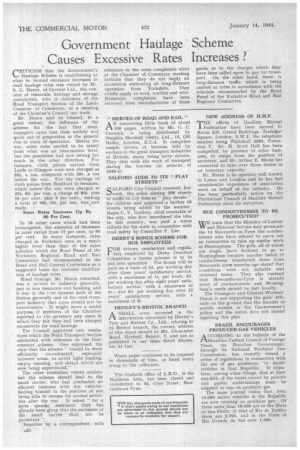News of the Week
Page 20

Page 21

Page 22

If you've noticed an error in this article please click here to report it so we can fix it.
M.O.W.T. HIRE RATE MODIFICATIONS
WE understand that important modifications are to be made in 'the rates paid to hired operators under the M.O.W.T. Long distance Haulage Scheme, and that 'a revised schedule, will be issued by the Ministry so soon as possible, but it was not available as we closed for press.
What will greatly relieve the anxiety amongst this class of operatoc is that the, cost of tyres will, we believe, be.. paid entirely by the Ministry. Rates for standing charges and running costs will also be increased and the allowance for workmen's compensation raised from 30s. to 90s. Another interesting possibility is a time allowance for the overhaul and maintenance of vehicles —the availability of hired vehicles may be made 46 weeks instead of 52, although payment will be made on the latter basis.
PROGRESS OF ROAD PANEL CHARGES COMMITTEE
CONSIDER ABLE progress was 'made at a first meeting of' the Road Pariel Rates and Charges Sub-committee of the Road ,and Rail' Central Conference, and the detailed work has been further sub-divided.
Mr. HarryWood, of Huddersfield, has accepted an invitation from the committee to be present at all meetings ; the. services of other experts are also assured.
LUTON HAULIERS TO DISCUSS PLANNING " BASIS "
HAULIERS in the Luton and district area will meet at 3 p.m., on January 17, at the Market Hill Conservative Club, Luton, to discuss the booklet, " The Road Carrying Industry and the Future," issued by a number of well-known men in the industry. Members of the Press, are invited. A precis of this publication appeared in our issue dated January 7.
CRANES TRAILER TO CARRY 140 TONS AST Tuesday, "The -Lines " pub1–dished brief details of what is claimed to be the largest-capacity, rubber-tyred trailer in the world. Constructed by Cranes (Dereham), Ltd., South Green Works, East Dereham, Norfolk, this vehicle has been built to carry electric transformers or other abnormal inchvisible loads weighing 120 tons. When the operating conditions are specially good, it can, however, deal with up to 140 tons.
Two box-section girders with crossniembers, some of similar section and others of tubular type, are carried between two " swan necks," which are hinged to the frame at their lower, ends, their 'movement being Controlled by two 75-ton hydraulic jacks. Incident'ally, this resembles the method adopted in the original Scammell 100tonner. At each end, also, is a small petrol engine for driving. a hydraulic pump, whilSt a hand pump is provided for emergency purposes. The jacks
serve the purpose of increasing ground clearance under the main frame when necessary.
The whole is supported on two bogies carried on 16 solid-rubber-tyred wheels. These and the " swan necks," complete with the jacks, can be detached, leaving the main frame on the ground for loading or unloading. The rear bogie has separate steering control for negotiating sharp turns; a second tractor can be used to assist this operation.
Communication between the driver on the front tractor and the steersman at the rear, is by microphone and loud speaker. The total loaded weight is between 165 and 185 tons. Braking is by air pressure and hydraulic means.
THE COMING OF THE TWOSTROKE OIL ENGINE WE have in course of preparation, and hope to publish in our next issue, an article dealing in detail with the G.M. Series 71, two-stroke oil engine, a product of General Motors. Those of our readers who are particularly interested in post-war vehicle design will find this article worthy of close attention. M.O.W.T. GAS SCHEME AND . COMPULSION AT a meeting held under the aegis of the Scottish C.M.U.A., in Glasgow, last Monday, Mr. F. G. Smith, of the Ministry, said that unless operators allocated sufficient vehicles for use with producer gas under the Govern. ment Scheme, the Ministry would apply for compulsory powers. It ,is claimed by many bus operators, for whomSir William Thomson (chairman of S.M.T.) Spoke, that the use of pro. ducer gas is extravagant on tyres, manpower and time-. Further developments will be watched with interest.
CLEARING HOUSES DEPUTATION TO LORD LEATHERS
ON January 6, the Minister of War Transport -received a deputation from the National Conference of Road Transport Clearing Houses, which wishesits mergbers to participate more fully in the work of the M.O.W.T. Road Haulage Scheme.
Hitherto clearing houses have received no official recognition in this connection. Traders and hauliers may, of course, still employ them, but no allowance is made by the Government in respect of commission; this, consequently, has to be added to the official rates es cha rged. OVERCOMING THE LEADED FUEL PROBLEM
ANY operator who fs experiencing trouble with exhaust valves or their seats, due to the action of M.T,80 leaded fuel, should write to the manufacturer of the vehicle or vehicles concerned and ask for a bulletin as to what modifications canbe made to engines at least to alleviate the position.
A new steel, known as X B, which is a stainless steel with a far greater resistance to burning, is being obtained as rapidly aspossible for the production of ' these valves. It is claimed that these will have a far longer life, as the deposit which causes much of the trouble in ordinary steels does not appear to build up an X B.
Many tests, including a number with . vehicles on the road, have been conducted by manufacturers and their agents, in order to find methods of ren dering engines as tolerant as possible of the new fuel. • Some people have recommended the addition Of ordinary lubricating oil to the fuel, but it must be remembered that the allocation of such oil is only about 3 per cent, of the supply of fuel. This would mean a great increase in the allocation of oil, which cannot be permitted.
By adopting the various practical recommendations, it is considered that the life of an ordinary valve can be increased to at least 10,000 miles, and, with the use of -the new steel, this may even be doubled.
A DAVID BROWN TRACTOR IN SECTION
ONE of the most interesting exhibits at the " Off the Ration " Exhibition, which was held for some time at John Lewis's bombed site. in Oxford Street, London, W.1, was a sectioned working model of a David Brown tractor. Extensive cutting of castings and components enabled the complete. operation to he followed through from the crankshaft to the final drive and
braking . system. Alongside it was shown a standard tractor of the 'same make, with its Comfortable, seat, scuttle and other refinements, and equipped with a .power lift and two-furrow, unitcontrolled plough The main purpose of this paragraph is to point out that this sectioned machine is being lent to the principal dealers and agents handling thismake of tractor, for local exhibition DEATH OF COMMANDER SIR FRANCIS ARMSTRONG, BART.
MANY of our readers will regret to hear that Commander Sir Francis Philip Armstrong, Bart., 011E.. R.N.V.R., who was secretary and general manager of the R.A.C. from 1923 to 1941, died suddenly on January 6, at the age of 72.
OPERATING OIL-ENGINED PLANT
THE training of men to take charge of stationary and transportable oil engines has received little attention, but a most .useful' and compact guide to this subject has now been written
by Mr. D. S. D. Williams, A.M.I.A.E., of the technical staff of " The Oil Engine." It is entitled " Simple Oilengined Plant Operation " and published at Is. 6d. net, for Temple Press Ltd., Bowling Green Lane, London, E.C.1, by The' English Universities Press Ltd., Warwick Square, London. E.C.4. It will be available from all booksellers and bookstalls, or at Is. 80., from either of the above mentioned.
TUNNEL PLANS ON TYNESIDE
ALTHOUGH the Ministry. of War Transport and the Durham and Northumberland County Councils are in favour of a Tyne tunnel between Jarrow and Howdon, the South F'-fields and Tynemouth Corporations have decided to prOceed with the-preparation' of a tunnel plan connecting their two towns. Messrs. Mott, Hay and Andersdn, of London, who prepared a report 'on. ti titfinel plan between North .and South : Shields'its -1930, have, been authorized to. prepare an amended report.
TRANSFERRED PLATES RESULT IN FINE ON FARMER I N consequence of having transferred the number plates, licence, etc., from one motor vehicle to another, said to be painted to locik like the first one, a farmer was fined £1 on each of nine summonses at Bradford 'City Police Court, last week.
A police sergeant said that on a midnight visit to defendant's farm he saw the two vehicles, originally private cars Which had been converted into agricultural vehicles. They were coloured red and black, and to all intents and purposes they looked alike. One was partially dismantled, and had tic exterior parts of identification at all. The other had originally been painted grey and black. The witness added that defendant later explained that he had made the change-over because a part of the first vehicle was damaged and he could not get a replacement.
For the defence, it was stated that defendant, who had 400 milk customers, got a 10 h.p. car to take the place of the other one, but instead of going to the taxation office to regularize the use of it he committed the act which led to the summonses.
MINISTRY'S DECISION AWAITED ON RETURN-FARES BAN, MORTH-EAST local authorities who Nattended a conference a month ago with Mr. P. J. Noel-Baker, Joint Parliamentary Secretary to the Ministry of War Transpoit, on the question of withdrawing the ban on return fares costing over 10d. are still awaiting the Ministry's decision. It is stated that.. even if the Ministry's decision be unfavourable,' the matter will. not be allowed to rest there.
NO -SPARE-TIME TAXI LICENt'ES FOR BUS DRIVERS I N view of a letter received from the
general manager of the. Devon General Omnibus Co., Ltd., stating that' he 'considered it most unadvisable that public service vehicle drivers should be licensed to. drive hackney carriages in their spare time, the highways committee of TOrquay Town Council has refused applications from two " .Devon General " bus drivers.,
"HEROES OF ROAD AND RAIL"
AN interesting little book Of about 100 pages, written by Mr. G. C. Curnock, is being distributed by Simpkin Marshall (1941), Ltd., 12, Old Bailey, London, E.C.4. It comprises simple stories of heroism told by workers in the great transport industries of Britain, many being lorry drivers. They deal with the work of transport during the heavier air attacks of 1940-41.
SALFORD ADDS TO ITS "PLAY STREETS " QALFORD City Council renewed, last Oweek, the order closing 208 streets to traffic in (lay time as " play streets " for children and approved a further 18 streets being added to the number. Major C. V. Godfrey, chief constable of the city, who first introduced the idea to this country, was paid a warm tribute for his work in connection with road safety by Councillor F. Lee.
DERBY'S BONUS SCHEME FOR BUS EMPLOYEES
FOR drivers, conductors and regulators employed by Derby Omnibus Committee a bonus scheme is to be put into operation The bonus will be paid on a basis of 2d. per working day after three years' satisfactory service, with a maximum of Is. per week; 4d. per working day after eight years' satisfactory service, with a maximum of 2s.; and 6d. per working day after 13 years satisfactory service, with a maximum of 3s
HENLEY'S BRISTOL BRANCH
ASMALL error occurred in the information circulated by Henley's Tyre and Rubber Co., Ltd., relating to its Bristol branch; the correct address of this depot should be 381, Gloucester Road, Horfield, Bristol, 7, and not as published in our issue dated December 31 last.
Waste paper continues to be required in thousands of tons, so hand every scrap to the collectors.
The Gosforth office of A.R.O., in the Northern Area, has been closed and transferred to 34, Grey Street, New castle-on-Tyne. •
NEW ADDRESS OF H.M.F.
THE offices of Hauliers Mutual Federation have been moved to Room 237, Grand Buildings. Trafalgar Square, London, S.W.I: the telephone number being Whitehall 4683, Extension 7. Mr, H. Scott Hall has been compelled, by pressure of other business, to resign from the position of secretary, and Mr. Arthur E. Meeks has coniented to take over those duties in an honorary capacity.
Mr. Meeks is an operator well known in Luton and London and he has had considerable experience of association work on behalf of the industry. He has been particularly active on the Provisional Council of Hauliers Mutual Federation since its inception.
BUS CONDUCTRESSES TO BE PROSECUTED?
WE learn that the Ministry of Labour and National Service may prosecute the 14 Newcastle-on-Tyne bus conductresses who have refused to carry out an instruction to take up similar work at Birmingham. The girls, all of whom are single, have declined to go to Birmingham because another batch of conductresses transferred there from Newcastle some months ago stated that conditions were not suitable and returned home. They also contend that Newcastle-on-Tyne is -already short of conductresses, and Birmingham's needs should be met locally.
The Transport and General Workers' Union is not supporting the girls' attitude on the ground, that the transfer of mobile women is the Government's policy and the union does not intend opposing this plan
BRAZIL ENCOURAGES PRODUCER-GAS VEHICLES ACCORDING to the bulletin of the Brazilian Federal Council of Foreign Trade, the Brazilian Government, through its National Producer Gas Commission, has recently issued a series of regulations in connection with the use of gas prop:lacers in motor vehicles in that Republic. It stipulates, among other things, that at least One-fifth of the buses owned by private and public undertakings must be adapted to run on producer gas The same journal states that over 15,000 motor -vehicles in the Republic are now running on producer gas. Of these moresthan 10,000 are in the State of San Paulo; in that of Rio de Janeiro there are 2,795, and in the State Of Rio Grande do Sul over 1,000.




















































